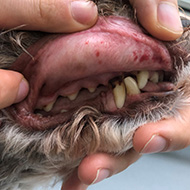
The RVC-led project aims to improve canine wellbeing.
Pet owners of dogs with autoimmune diseases are being invited to take part in a study to improve the wellbeing of those diagnosed in the future.
The study is being led by Drs Barbara Glanemann and James Swann at the RVC, who have created an observational registry to gather information about dogs recently diagnosed with autoimmune disease.
The ‘ImmunoRegistry’ data will be collected in real-time over a year after diagnosis to find out how the dogs respond to treatment.
Dr Glanemann explained: “We are looking to observe as many dogs as possible so that we can examine the data and ultimately share more informed advice and guidance with vets, and in turn, owners.
“This ambitious project relies on the enthusiasm and support of dog owners, and we look forward to using our results to improve the wellbeing of any dog diagnosed with immune-mediated disease in the future.”
The observational registry will collect data on dogs diagnosed in local practices and specialist hospitals. Researchers will then use the information to examine the prognosis associated with the diseases, if there are risks or relapse and whether medication works better in certain dog breeds.
In particular, the team is seeking dogs diagnosed with IMHA, ITP, IMPA or SRMA. To meet the criteria, pet owners should:
- be UK based
- register their interest and consent to participate in the study within 14 days of their dog receiving a diagnosis of one of the above conditions
- be willing to fill out six, five-minute surveys on the quality of life of their dog over 12 months following diagnosis.
For more information and to register your interest, visit rvc.onlinesurveys.ac.uk/immunoregistry
Image (C) RVC.



 BSAVA is to partner with BVA Live (11-12 June 2026) to champion clinical research.
BSAVA is to partner with BVA Live (11-12 June 2026) to champion clinical research.